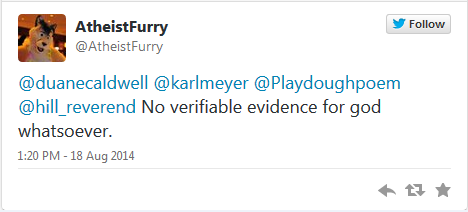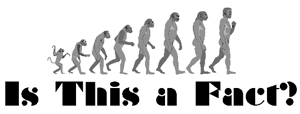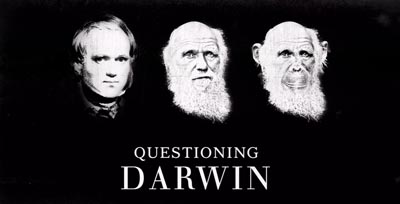The IMDB storyline synopsis of HBO’s recent1 documentary ends with the statement, “the film takes a balanced look at this 150-year-old debate.” It appears the film wants to take a balanced look, and they certainly had the opportunity, but if they were trying to achieve a balanced look, they failed miserably. Either the writers are so steeped in anti-Christian evolutionist doctrine that they couldn’t see their own bias, or they willfully withheld important data that is relevant to the discussion. Or perhaps it’s a bit of both. If they were seriously trying to present objections of those who “Question Darwin” why have they chosen to only present the case from the point of view of Bible believing Christians (of which I, of course, am one)? Such objections stem primarily from the fact that evolution is in direct contradiction to Biblical teaching. But that is not the only source of objections. Why did they not also present the case of scientists who do not believe in evolution from a scientific point of view? Surely the existence of scientific objections to Darwin is not a newsflash to the writers of a documentary on Darwin. There is an entire site highlighting the hundreds of scientists who have signed their names to the statement:
The site is Dissentfromdarwin.org and you can look up all the scientists who dissent yourself. Instead, the picture that is painted is that only fundamental, Bible believing Christians who, as the narrator tells us, “… believe their Bible is the Word of God, the ‘literal truth’ …”2, don’t believe in Darwinian evolution. That only Christians object to Darwin is clearly not the case and so that is a misrepresentation. The fact that they have omitted any reference to any scientific objections to Darwin points to what this documentary is really about: questioning Christians who question Darwin. Without speaking to those responsible for this production, one can only speculate as to their motives. But based on what they choose to include (statements from Christians without any investigation as to whether they might be true) and what they chose to omit (objections from scientists who disagree with Darwin’s theory), and the amount of time they spent explaining how Darwin arrived at his theory vs. the amount of time spent showing Christians who “question Darwin,” the motives seems clear: to present Christians as slightly irrational, slightly backwards, science rejecting people whose opinions should not be taken to seriously in this matter. Unfortunately, too often Christians provide ample fodder for this distorted view. A pastor3 is shown saying, “If in the bible I were to find a passage that says 2 + 2 = 5, I wouldn’t question what I’m reading in the Bible, I would believe it, accept it as true, and then do my best to work it out and understand it.” Brother, I understand what you’re saying. It is incumbent on the reader of the Bible to investigate further to work out apparent contradictions so as to resolve the contradiction and understand what the Biblical writer was saying. (Of course that clarification was not in the documentary.) For instance, Jesus while standing in the magnificent temple that took 46 years to build is quoted as saying, “Destroy this temple and I will raise it again in three days.” (John 2.19) This was clearly misunderstood by his audience, the Jews. (As it would be by anyone in that context who didn’t know Jesus.) Thankfully John, the writer of the gospel explains what he meant – that he was referring to his body. So Jesus was in essence saying if you kill me, I will physically raise this body and make it live again in 3 days, which is proof of my claims. A prediction and a promise he made good on that first Easter Sunday by his resurrection from the dead. So I understand the pastor to be underscoring the importance of working out apparent contradictions – though he chose, in my estimation, a poor example to illustrate the point. Arithmetic statements by nature and design leave little room for interpretation; and as such don’t illustrate the broad (though clear) range of meaning that verbal statements may convey, particularly when set in various contexts. So while his point is valid, it was used by this production to stereotype Christians as following blindly without a rational basis. As I state in What is Rational Faith Part 2, Christian Faith does not require a blind leap of faith. From there, the depiction of Christians gets worse, with a Professor accusing Christians of lying to children because they teach as truth what’s taught in the Bible; things that contradict evolution such as creation and a young earth. His exact statement was:
Clearly, instead of looking at scientists today who “Question Darwin” and how they view Darwin’s theory against today’s evidence, the writers chose to channel the accusations of the new atheists, who accuse Christians of child abuse for teaching them religion.5 Instead of looking at the scientific questions, they chose to look at how Christians interpret the Bible, apparently appalled that Christians can take Genesis “literally”6, and even more appalled that such an approach can be persuasive, noting:
That fact is only surprising (and disconcerting) to those who have bought into Darwinism lock, stock and barrel. While the program does an admirable job of correctly articulating Christian views – since they directly quote Christians, and even shows scenes from Ken Ham’s Creation Museum – still it is quite apparent that they mean to question those views. With their disdain for the views of those who doubt Darwin apparent, their refusal to show scientists who doubt Darwin gives the show a strong appearance of suppressing the evidence. This point is underscored by the fact that they had comments from former college professor Dr. Jobe Martin, who has published evidences against evolution in titles such as Incredible Creatures that Defy Evolution (I-III), but you don’t see any of his evidences; he provides history and commentary on Darwinism and its effects. Yet as philosopher of science and Intelligent Design advocate Dr. Stephen Meyer put it,
You won’t see any of the counter arguments to Darwin in this documentary however. In fact to the contrary, Darwin is presented as a hard working, state of the art (even if it is 19th century art) scientist who worked tirelessly to gather evidence for his theory. We are told of all the specimens he examined and the correspondences he had with other scientists. Darwin no doubt considered himself an objective researcher. (We’re supposed to believe that too.) We’re led to believe that his conclusions were valid based on all the research he did, however the documentary never bothers to mention or even question if the research that he conducted supported the conclusions he jumped to. The evidence suggests his research did not support his conclusions. The documentary makes clear however that he suffered greatly at the loss of his favored daughter Annie, and couldn’t understand why there should be evil in the world. Outspoken creationist, Ken Ham, president of Answers in Genesis graciously offers that if his theology professors had told him the source of evil was sin – not God, it may have changed his perspective. What is more likely the case, (since as the documentary tells us, Darwin once intended to be a clergyman) is that Darwin knew what the Bible said about the cause of evil, but didn’t care. It appears Darwin was determined to reject God in spite of the Bible’s explanation of evil in the world. The documentary further wants you to believe Darwin let science direct his thinking, not his (anti-God) theology; and that he reluctantly came to the conclusion that evolution is true. We are supposed to believe that he was objective about it all because he is quoted as saying: Continue Reading |
Category Archives: Evolution
GULO and other Irrational Atheist Arguments – Part 2
7 Popular, but Fallacious Arguments by Atheists
 Evolution uses circular arguments to support the supposition that dinosaurs became extinct 65 million years ago. Evolution uses circular arguments to support the supposition that dinosaurs became extinct 65 million years ago. |
More arguments used by atheists that upon inspection are clearly wrong and fail to support atheistic or evolutionary doctrine. |
|||
| In Part 1 of this article I discussed problems 1 and 2: GULO and LUCA respectively and why they are irrational arguments. In closing the discussion on LUCA I noted that evolutionists and atheists are blind to evidence of intelligent design. This leads into our next irrational argument: 3. “There’s no evidence”Atheists and Evolutionists alike tend to use this argument for anything they don’t believe. They don’t believe in God, so they say there’s no evidence of God. They don’t believe in intelligent design, so they say there’s no evidence for it. They don’t believe in miracles, so they say there’s no evidence of them. This argument is particularly common in the twitter world: 
Notice the above person states no “verifiable” evidence. This means there is no evidence you can present that will meet his standard for “verifiable.” (An illicit shifting of the burden of proof.) The problem with saying “there’s no evidence” is you must then explain away all the sites with evidence – like this one, or creation.com or answersingenesis.org or a host of other sites and books (including the Bible) which provide the evidence against evolution and for God and intelligent design which they claim doesn’t exist. Brian Auten provides a list of such sites on his Apologetics315 here. In light of the overwhelming evidence, one is tempted to say they’re simply lying. After all, it’s one thing to say the evidence is misunderstood; quite another to say that none exists. But there are at least two other dynamics likely at play here.
Part of the light of the gospel is the fact that God exists and God created. The god of this age – Satan – doesn’t want you to believe that; so those following atheistic or evolutionary beliefs have unwittingly fallen for yet another lie of the father of the lies, which keeps them captive to false philosophies. We must pray for such people in hopes that “they will come to their senses and escape from the trap of the devil, who has taken them captive to do his will.” (2 Tim 2.26)
4. “Dinosaur fossils are millions of years old “Everyone knows what wiped out the dinosaurs. Sixty five million years ago it came from outer space.”1 So begins a documentary entitled “What really killed the dinosaurs?” It perpetuates the supposed date which scientists have settled on as the date for when the dinosaurs became extinct: 65 million years ago. Scientists also use fossils to verify that date – a date which supports an old earth theory of earth history instead of a young one. But as Kent Hovind is fond of pointing out the fossil evidence argument is a circular one. He relates the story of a visit he took with his daughter to the School of Mines & Technology Museum of Geology, Rapid City S.D. His daughter asks the tour guide” Continue Reading |
||||
GULO and other Irrational Atheist Arguments – Part 1
7 Popular, but Fallacious Arguments used by Atheists
For those wondering why the apostle cast out a demon providing free advertisement for him, the answer is simple: God’s people are forbidden from having anything to do with demons2 – even if what they do is initially helpful. The amazing thing to Christians is that Paul put up so long with it. I mention it because I likewise feel troubled by the recurring contention of Atheists that the pseudo-gene known as GULO or GLO proves common descent. So let me
1. “GULO proves Evolution” What is GULO and how does it supposedly prove evolution?
L-gulonolactone oxidase – commonly known as GULO – is a gene designed to synthesize vitamin C from glucose or galactose, but in some groups of animals, the GULO gene does function in that manner, and so it is given the label of “pseudogene.”4 Additionally, the gene is “broken” reportedly in the same place in multiple species resulting in a loss of the ability to synthesize vitamin C. Humans are not able to synthesize vitamin C. Neither are guinea pigs, chimpanzees and several species of monkeys along with some species of birds, bats and fish. Evolutionists look at these facts and conclude that the only way the gene could have broken in the sample place is if the gene of a common ancestor became broken, and that same broken gene was then inherited by subsequent descendants. Thus to their way of thinking the only way this broken gene would show up in multiple species is if it started in a common ancestor. Recent evidence refutes this conclusion, and the attempts by evolutionists to salvage their conclusion makes matters worse – Continue Reading |
||||||
Does where you’re born determine what you believe?
 |
Is your faith merely a product of your location and culture? |
Here’s a conceit that atheists allow themselves that would be amusing if it weren’t so utterly false and insulting to everyone who’s not an atheist. It goes something like this:
If you believe in God, you’re a slave to beliefs imposed upon you in your youth. You’re a slave to the beliefs from the area of the world and culture you grew up with. On the other hand if you’re an atheist, you’re not subject to such imposition, and have freed yourself of such beliefs. Of course they don’t put it that way, they usually phrase it something like this:
Dear theists: If you were born in India you’d be Hindu if you were born in Iraq you’d be Muslim if you were born… I’d still be an atheist
— Atheist World (@AtheistWorld)
August 29, 2013
Did you catch the conceit? Apparently, atheists believe they are somehow superior and they and only they have the power to choose what they believe. They thereby implicitly state that theists are weak and ignorant; and explicitly state theists are slaves to whatever belief was imposed upon them while they were growing up. What remains unanswered is for atheists who grew up in a family with theistic beliefs, why they too didn’t remain a slave to such beliefs?
Others1 have addressed this topic, but let me try to succinctly add some glaring issues with this argument:
First off it’s logically fallacious, falling to the logical fallacy of Special Pleading -where the arguer finds fault with a particular proposition or situation; yet they themselves fit the proposition or situation. Nonetheless they believe their conclusion does not apply to them – and provide no reason for believing themselves to be the exception. This is a classic case of irrational special pleading.
Secondly, many atheists continue to believe that Continue Reading
Denying the Obvious
.jpg) Boeing 747 Intercontinental Those who can’t see the design behind clearly designed things such as a 747 or a human cell are denying the obvious. |
||||
In his critique of Stephen Hawking’s “Grand Design”, John Lennox writes:
Stephen Hawking is not the only atheist who doesn’t realize he’s engaging in metaphysics by dealing with questions of God. And that is not the only truth atheists fail to recognize. As I demonstrate below, many have a problem acknowledging that they are working not from scientific fact, but from deeply held belief. Lennox is not the first to point out obvious errors to someone who refuses to acknowledge it.
With these words Jesus advises careful and close self examination to avoid not only the charge of hypocrisy, but this current issue of self denial. After all one can hardly miss a “plank” or “beam” in the eye unless one is intentionally refusing to acknowledge it. That’s denial. And while some may find it questionable to poke the bear by appealing to a historical figure that some atheists deny, what is undeniable is the logic and wisdom of the advice. I mention it because one of the reasons for this blog is to point out errors, blind spots and logical inconsistencies that atheists tend to be either unaware of, or attempt to avoid by refusing to address. As a creationist attempting to point out such errors and inconsistencies, I find I keep running into the same kinds of invalid (and often irrational) arguments from atheists, such as:
Often, when you point out these errors, they are not addressed, not because the objection is not understood, but because there simply is no reasonable answer to the objection. So instead of acknowledging a problem with their world view, typically the response from atheists or agnostics will be show their inability to address the issue by to changing the subject and/or launching ad hominem attacks. But in refusing to address a glaring problem in their argument or logic by attempting to side step it, it leads one to an inescapable conclusion:
By irrational I mean untrue, or in the case of an argument, invalid for any of a number of reasons. By refusing to acknowledge or address such blatant errors what they are actually communicating is – Continue Reading |
Can you be A Christian and Believe in Evolution?
 What atheists have noticed that many Happy Thinking Christians have not What atheists have noticed that many Happy Thinking Christians have not |
||||
|
Christian Evangelist and defender of the Gospel Ravi Zacharias talks about how to reach the “Happy Thinking Pagan.” He describes their thought process this way:
I mention it because it is becoming increasing clear to me that when it comes to the creation / evolution debate, there is a large number of Christians who are walking in the thought process of the happy thinking pagan – namely Interestingly enough, thoughtful atheists have noticed the incompatibility between evolution and the Christian faith. Evolutionary evangelist Richard Dawkins has commented:
In fact, so many atheists have begun proclaiming the incompatibility between Christianity and Evolution that one blogger Continue Reading |
Evolution – A Faith Commitment
 Though they’ll never admit it, most evolutionists adhere to evolution as followers in any other religion adhere to their faith. Though they’ll never admit it, most evolutionists adhere to evolution as followers in any other religion adhere to their faith.
|
||||
| In what was intended to be the first article I posted on this site – What is Rational Faith, Part 11 – I mentioned that those who believe in the godless theory of Evolution (which includes most atheists and materialistic scientists) – adhere to it as one adheres to and follows a religious faith. In other words it has taken on the significance of religion in their lives. Most evolutionists would deny this, as would atheists who think that because they define their atheism as a lack of faith/belief in God, they therefore think themselves immune to the common banalities (as they might describe it) of being a follower of a faith. Yet when you look at the impact of evolution on their lives, and how it changes their thoughts and behaviors, one can only conclude that for those who thoroughly understand the theory, it has taken the place of God in their lives2. Now you’ll note I’ve qualified the statement by the phrase “those who thoroughly understand the theory.” I do so to distinguish the true adherents from those who follow it without thinking because it’s the “in” thing to do; it’s the majority belief, and they don’t want to be out of the main stream or worse – appear ignorant, or as John C. Lennox puts it, they
Those who know little about evolution apart from the fact that it supposedly tells us where we came from and it’s what scientists believe, should read articles like Reclaiming The Intellectual and Moral High Ground – which will inform them both on claims made regarding evolution – and why they’re incorrect. If they still believe in evolution, then they appear to have a faith commitment as do other adherents to the Evolutionary faith. So now that we understand about whom I’m speaking the question becomes how can I defend such a claim? Simply – by the fact that those believe in evolution exhibit the same signs and behaviors as those who follow any other religious faith. As the saying goes, if it looks like a duck, and walks like a duck, a quacks like a duck – it’s probably a duck. There are a number of such tell tale signs, let me just give you a few off the top of my head: Continue Reading |
Time to End the In House Debate
 Among Christians there should be no questions or debates about the origins of life, the earth or the universe. |
||||
|
– How important is this for Christians to deal with? Dr. Danny Faulkner, Author, Distinguished Professor Emeritus, retired and now on staff with Answers in Genesis and its Creation Museum responded:
True, but Dr. Faulkner misses the elephant in the room. Dr. Hugh Ross, Astronomer and best-selling author responded:
Dr. Ross’ answer not only misses the elephant in the room, but it is also very misleading. Why do the biblical creeds not mention the time of creation? (More importantly the duration.) Because that is not one of the issues they were dealing with at the time. In the first few centuries after Christ’s resurrection, the church was besieged with Christological issues – docetism (Christ only seemed to have a body but was really just spiritual), gnosticism (a whole range of errors regarding God from which we get the phrase “children of a lesser god”; errors regarding Christ; and the nature of good and evil), monophysitism (Christ had only one nature), and so on. So they were concerned with clearly and correctly defining who Christ was – that he was “very God from very God” (from the Nicene Creed) and “one person with two natures” (From the Definition of Chalcedon). The Nicene Creed was written in 325 AD; the definition of Chalcedon was written in 451. The issue of the length of creation didn’t come up until needed for evolution, and Darwin didn’t publish “Origin of Species” until 1859. So of course the creeds don’t deal with that. Dr. Ross also states big bang cosmology identifies the who of creation as the God of the Bible. Really? Perhaps he should tell that to Continue Reading |
A question of authority
What will it take for you to believe? Charlton Heston as Moses – “You are not worthy to receive these commandments” |
||||
|
Twitter is of course home to many ongoing debates, one of which is the ongoing debate between atheists and theists; creationists and materialists – those who adhere to the standard non-supernatural theories of origins for the universe and life. One such debate was brought to my attention with the following tweet:
To the contrary:
This directly contradicts the contention that all fossils are “arranged in evolutionary order”. In fact the situation is worse than that when one considers Continue Reading |
Science by Fiat & failed Judo throws – Cosmos’ failed attempts to defend evolution
 In a failed attempted to defend evolutionary theory, Cosmos Episode 2 resorts to science without evidence, and evidently expects to be believed “because I said so.”
…is there a question evidence anywhere in our future? |
||||
|
In the classic 1980’s Wendy’s ad, Clara Peller, after looking at a hamburger that’s mostly bun and almost no meat famously asks, “Where’s the beef?” After watching the second episode of the reboot of Cosmos – titled Cosmos A Space Time Odyssey episode 2 – Some Of The Things Molecules Do I was reminded of that ad as I wondered “Where’s the science?” This episode of Cosmos wants to convince you that evolution is true, and it’s Yes, Cosmos took a page straight out of a judo manual: Continue Reading |


